Hormone-balancing teas can greatly improve your sleep naturally by addressing the root causes of sleep disturbances. These teas contain ingredients like chamomile, valerian root, and lavender that work synergistically with your body's hormonal systems. They help regulate cortisol levels, boost melatonin production, and increase GABA, promoting relaxation and better sleep quality. By reducing anxiety and stress, these teas create an ideal environment for restful sleep. Additionally, adaptogenic herbs in some blends support overall hormonal balance, further enhancing sleep patterns. Incorporating these teas into your nightly routine can lead to more restorative sleep and improved overall well-being. Discover the specific herbs and brewing techniques that can transform your sleep experience.
Understanding Hormones and Sleep
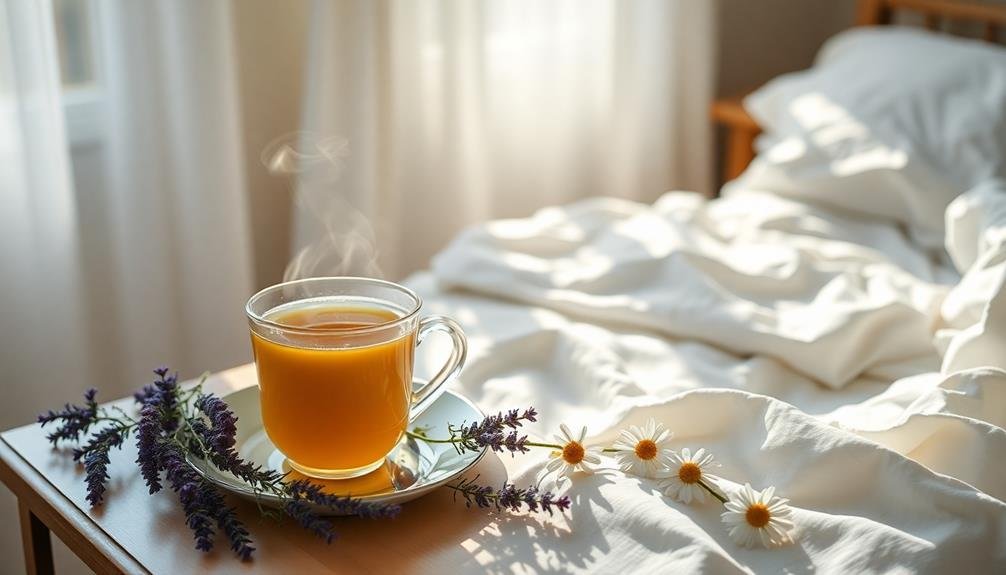
Our body's hormones play an essential role in regulating sleep patterns. You mightn't realize it, but hormones like melatonin, cortisol, and growth hormone work together to control your sleep-wake cycle.
Melatonin, often called the "sleep hormone," is produced by your pineal gland in response to darkness. It helps signal your body that it's time to sleep.
Cortisol, known as the "stress hormone," follows a natural rhythm throughout the day. It's highest in the morning, helping you wake up, and lowest at night, allowing you to wind down.
Growth hormone is released during deep sleep, supporting tissue repair and overall health.
Other hormones, like estrogen and progesterone in women, and testosterone in men, also influence sleep quality. Imbalances in these hormones can lead to sleep disturbances. For instance, low estrogen levels during menopause often cause night sweats and insomnia.
Understanding how hormones affect your sleep can help you identify potential issues and take steps to improve your sleep quality.
Key Ingredients in Sleep-Enhancing Teas
A steaming cup of tea can be your passport to better sleep. The key lies in choosing teas with ingredients known for their hormone-balancing and sleep-promoting properties. These natural compounds work synergistically to calm your mind, relax your body, and prepare you for a restful night.
Chamomile is a popular choice, thanks to its apigenin content, which binds to specific receptors in your brain that may decrease anxiety and initiate sleep. Valerian root is another powerful herb that can increase gamma-aminobutyric acid (GABA) levels, promoting relaxation and improving sleep quality. Lavender, known for its soothing aroma, can also be found in sleep-enhancing teas, helping to reduce stress and anxiety.
Other beneficial ingredients include:
- Passionflower, which may boost GABA production and reduce insomnia symptoms
- Lemon balm, shown to improve sleep quality and reduce stress
- Magnolia bark, containing compounds that may help you fall asleep faster
When selecting a hormone-balancing tea for sleep, look for blends that combine these ingredients. You'll be giving your body the natural support it needs to regulate hormones and achieve restful sleep.
Adaptogenic Herbs for Hormone Balance
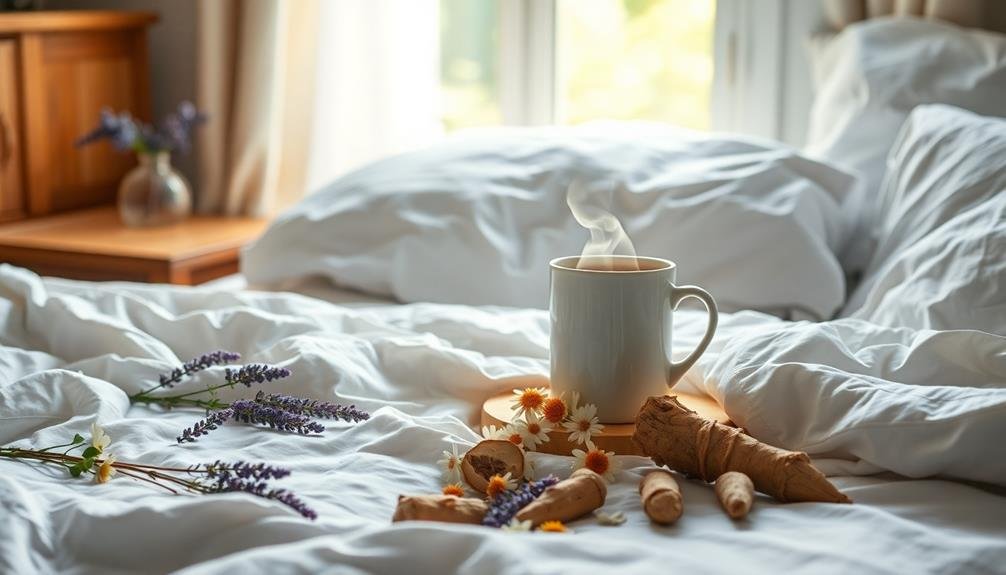
While the herbs mentioned earlier focus primarily on sleep enhancement, adaptogenic herbs play an essential role in overall hormone balance, which can greatly impact your sleep quality. These powerful plants help your body adapt to stress and maintain equilibrium, supporting your endocrine system and promoting better sleep.
Here's a quick guide to some key adaptogenic herbs and their benefits:
| Herb | Benefits |
|---|---|
| Ashwagandha | Reduces cortisol, eases anxiety |
| Rhodiola | Boosts energy, improves mood |
| Holy Basil | Lowers stress, balances blood sugar |
| Maca | Supports adrenal function, enhances libido |
| Schisandra | Improves focus, protects liver health |
You'll find these herbs can make a significant difference in your sleep patterns when incorporated into your nightly tea routine. They work by regulating your body's stress response, which often disrupts hormone balance and sleep cycles. By sipping on adaptogenic tea blends, you're giving your body the tools it needs to maintain hormonal equilibrium throughout the day and night. This balanced state allows for more restful, rejuvenating sleep and helps you wake up feeling refreshed and energized.
Chamomile: Nature's Sleep Inducer
Chamomile's sleep-inducing properties have made it a go-to herb for those struggling with insomnia. This gentle, daisy-like flower contains apigenin, a flavonoid that binds to specific receptors in your brain, promoting relaxation and drowsiness.
When you brew chamomile tea, you're tapping into centuries of traditional wisdom backed by modern scientific research.
Drinking chamomile tea before bed can help you:
- Fall asleep faster
- Improve sleep quality
- Reduce anxiety and stress
The hormone-balancing effects of chamomile are particularly beneficial for women experiencing menstrual or menopausal symptoms. It can help regulate cortisol levels, reducing stress-induced sleep disturbances.
Additionally, chamomile's anti-inflammatory properties may alleviate physical discomfort that often interferes with restful sleep.
To maximize chamomile's sleep-inducing benefits, steep your tea for 5-10 minutes and drink it 30-45 minutes before bedtime. You can enhance its effects by combining it with other sleep-promoting herbs like lavender or valerian root.
Valerian Root's Impact on Sleep
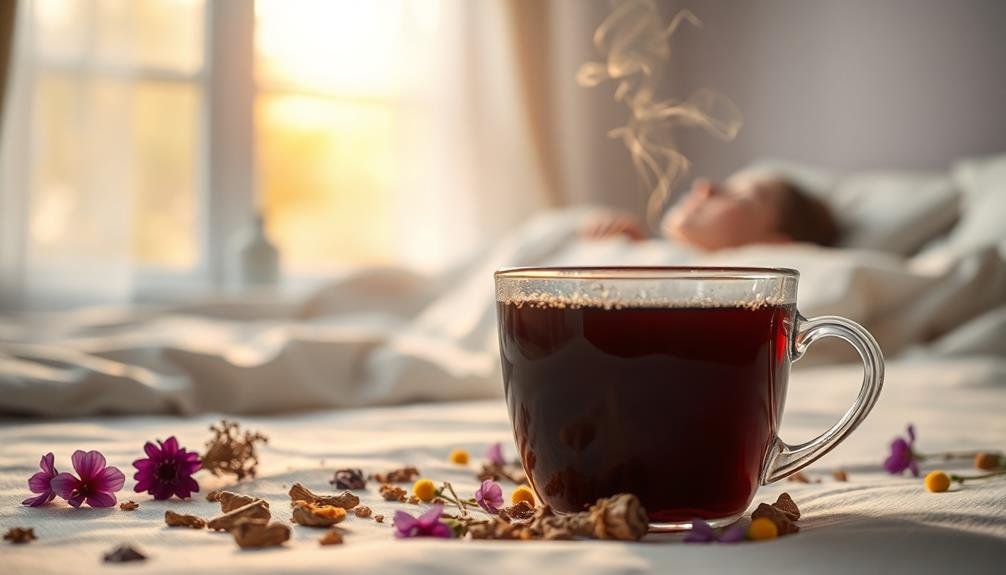
Valerian root is renowned for its potent sleep-inducing properties, making it a popular choice for those struggling with insomnia.
You'll find that this herb works by increasing the levels of gamma-aminobutyric acid (GABA) in your brain, which helps calm your nervous system and promote relaxation.
While effectiveness can vary among individuals, studies suggest that a typical dosage of 300-600mg of valerian root extract, taken 30 minutes to two hours before bedtime, may improve your sleep quality and reduce the time it takes to fall asleep.
Valerian's Sleep-Inducing Properties
For centuries, herbalists have turned to valerian root as a natural remedy for sleep troubles. This powerful herb contains compounds that interact with your brain's GABA receptors, promoting relaxation and reducing anxiety.
When you consume valerian root tea, you're tapping into its sleep-inducing properties, which can help you fall asleep faster and improve your overall sleep quality.
Valerian's effectiveness in promoting sleep stems from its ability to:
- Increase the production of gamma-aminobutyric acid (GABA), a neurotransmitter that calms your nervous system
- Reduce the time it takes to fall asleep, known as sleep latency
- Enhance slow-wave sleep, the deepest and most restorative stage of sleep
You'll find that valerian root tea can be particularly beneficial if you struggle with insomnia or occasional sleeplessness.
Its natural sedative effects can help you unwind and prepare your body for rest without the harsh side effects often associated with pharmaceutical sleep aids.
Dosage and Effectiveness
When it comes to harnessing the sleep-inducing benefits of valerian root, proper dosage is key. You'll typically find valerian root available in capsules, tablets, or liquid extracts. For capsules or tablets, a standard dose ranges from 300 to 600 mg, taken 30 minutes to two hours before bedtime. If you're using a liquid extract, aim for 1 to 2 ml.
It's important to note that valerian root's effectiveness can vary from person to person. Some individuals may experience improved sleep quality within a few days, while others might need to use it for several weeks before noticing significant results.
Studies have shown that valerian can reduce the time it takes to fall asleep by an average of 15 to 20 minutes.
To maximize its effectiveness, you should maintain a consistent sleep schedule and create a relaxing bedtime routine. Avoid caffeine and electronic devices in the hours leading up to sleep.
If you're taking any medications or have underlying health conditions, consult your healthcare provider before incorporating valerian root into your routine. While generally safe, some people may experience mild side effects like headaches or dizziness.
Lavender for Relaxation and Calm
You'll find lavender to be a powerful ally in your quest for better sleep.
Its calming aroma can greatly reduce anxiety and stress, helping you relax before bedtime.
Lavender's Calming Aroma
Lavender's soothing fragrance has long been associated with relaxation and tranquility. When you inhale its calming aroma, you're tapping into a powerful natural remedy that can help balance your hormones and improve sleep quality.
The scent of lavender interacts with your brain's limbic system, which controls emotions and memory, promoting a sense of calm and reducing stress levels.
Research has shown that lavender's aroma can:
- Lower cortisol levels, the stress hormone that can disrupt sleep patterns
- Increase the production of melatonin, the hormone responsible for regulating sleep-wake cycles
- Activate GABA receptors in the brain, which help calm nervous system activity
Reducing Anxiety and Stress
A cup of lavender tea can be your secret weapon against anxiety and stress. This aromatic herb contains compounds that interact with your brain's neurotransmitters, promoting relaxation and reducing tension. When you sip lavender tea, you're not just enjoying a soothing beverage; you're actively supporting your body's stress response system.
Lavender tea works on multiple levels to combat anxiety and stress:
| Physical Effects | Mental Benefits |
|---|---|
| Lowers cortisol levels | Calms racing thoughts |
| Relaxes muscle tension | Improves mood |
| Reduces heart rate | Enhances focus |
| Improves sleep quality | Decreases worry |
| Supports digestive health | Boosts emotional resilience |
Brewing Your Perfect Sleep Tea
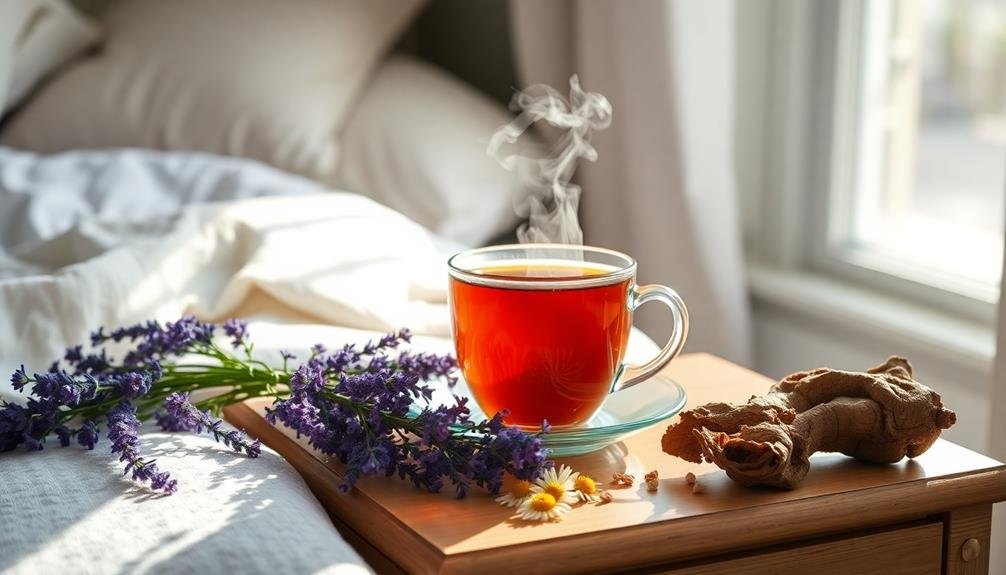
Once you've selected your preferred sleep-promoting tea ingredients, it's time to brew the perfect cup. Start by heating fresh, filtered water to just below boiling point, around 195°F (90°C). This temperature helps extract the ideal flavor and beneficial compounds from your herbs without scorching them.
Use about 1 teaspoon of dried herbs or 1 tablespoon of fresh herbs per cup of water. Steep your tea for the appropriate time, typically 5-10 minutes for most herbal blends. Longer steeping times can increase the potency of sleep-inducing compounds but may result in a stronger, more bitter taste. Experiment to find your ideal balance.
To enhance your tea's sleep-promoting effects:
- Add a splash of warm milk or non-dairy alternative for a boost of tryptophan
- Stir in a teaspoon of raw honey for its natural melatonin content
- Include a few drops of lavender essential oil for extra relaxation
Sip your tea slowly about an hour before bedtime, allowing its calming effects to gradually prepare your body and mind for sleep.
Frequently Asked Questions
Can Hormone-Balancing Tea Interact With Prescription Medications?
Yes, hormone-balancing tea can interact with prescription medications. You should always consult your doctor before adding it to your routine. It's important to disclose all supplements you're taking to avoid potential complications with your medications.
How Long Does It Take to See Results From Drinking Sleep-Enhancing Teas?
You'll typically notice improvements in sleep quality within 1-2 weeks of regularly drinking sleep-enhancing teas. However, individual results may vary. Be consistent with your nightly tea routine, and you'll likely experience better sleep sooner.
Are There Any Potential Side Effects of Regularly Consuming Hormone-Balancing Teas?
While hormone-balancing teas are generally safe, you might experience side effects like digestive issues, headaches, or hormonal fluctuations. It's best to consult your doctor before regular use, especially if you're pregnant or have existing health conditions.
Can Children or Pregnant Women Safely Drink Hormone-Balancing Sleep Teas?
You shouldn't give hormone-balancing sleep teas to children or pregnant women without consulting a doctor. These teas can affect hormone levels, which may be risky during pregnancy or childhood development. Always prioritize safety and seek professional advice.
How Many Cups of Sleep Tea Should Be Consumed Daily for Optimal Results?
You'll typically want to drink 1-2 cups of sleep tea daily for best results. Have one cup about an hour before bedtime. Don't exceed 3 cups per day, as it might lead to unwanted side effects.
In Summary
You've now learned how hormone-balancing teas can naturally improve your sleep. By incorporating these soothing brews into your nightly routine, you're taking a gentle yet effective approach to better rest. Remember, consistency is key. Experiment with different blends to find what works best for you. Whether it's chamomile, valerian, or lavender, you're giving your body the natural support it needs for more restful nights and energized days.

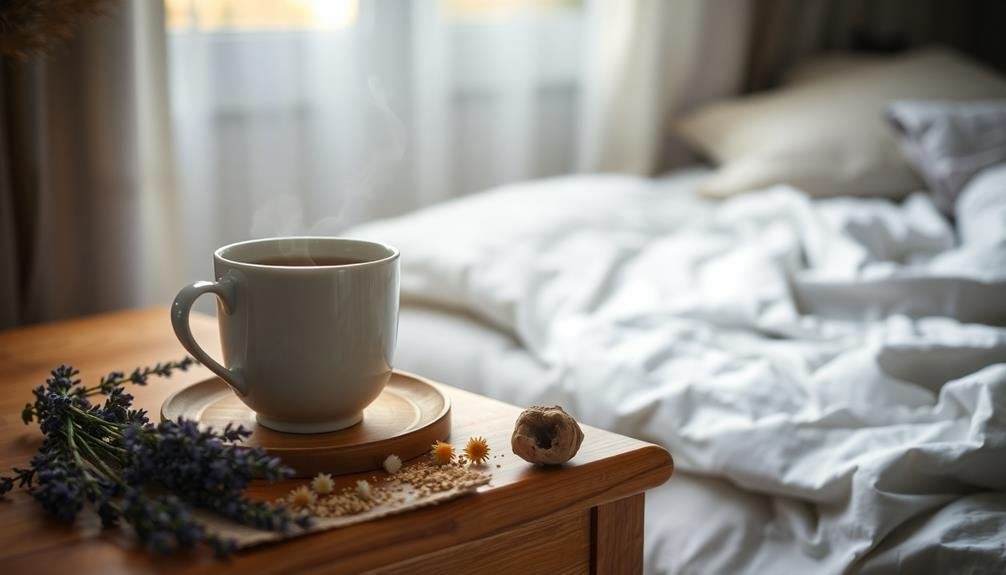



Leave a Reply